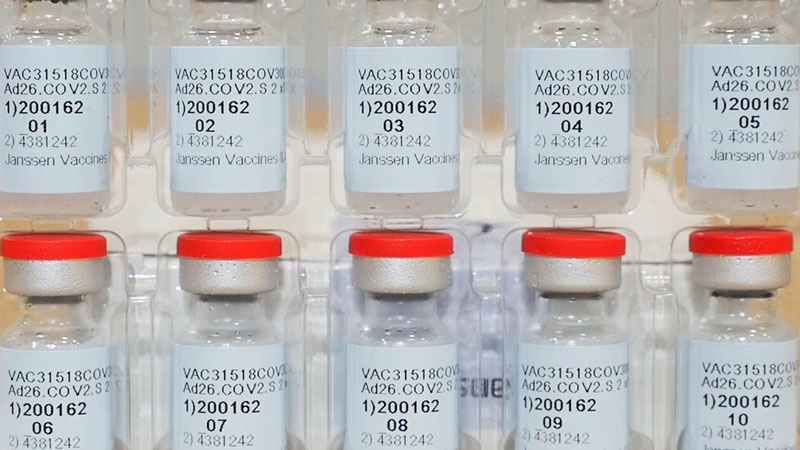Minnesota medical experts applaud FDA’s emergency approval for J&J vaccine
And then there were three.
On Saturday, Johnson & Johnson’s COVID-19 vaccine for adults 18 and older received emergency use authorization from the Food and Drug Administration, joining the formulas developed by Moderna and Pfizer.
“Supply of the vaccine is the most important thing for us right now,” says Dr. Jodie Dvorkin, the Associate Medical Director for ICSI, a Bloomington-based clinical systems advisory group. “We need to get as many shots in arms as possible.”
Dvorkin is among the medical experts in Minnesota applauding the emergency go-ahead for the one-shot vaccine.
“Because right now we have demand strongly outweighing supply,” explains Dr. Zeke McKinney, a HealthPartners physician. “Getting a third vaccine as part of our arsenal in fighting the pandemic is just another great thing.”

This Dec. 2, 2020 photo provided by Johnson & Johnson shows vials of the Janssen COVID-19 vaccine in the United States. Johnson & Johnson’s single-dose vaccine protects against COVID-19, according to an analysis by U.S. regulators Wednesday, Feb. 24, 2021, that sets the stage for a final decision on a new and easier-to-use shot to help tame the pandemic.[Johnson & Johnson via AP]
The authorization is expected to trigger shipments of nearly 4 million doses as early as Monday.
“We should be strongly encouraging people to get the first one they can get their hands on because that’s good for outbreak control in general,” said Dr. Frank Rhame, an Allina Health infectious disease specialist.
FDA issues emergency use authorization for one-dose J&J COVID-19 vaccine
Rhame was the principal investigator for Allina’s phase three clinical trial for the Johnson & Johnson vaccine.
That study, launched in November, compared outcomes of people who were given a placebo with those who received injections of the vaccine.
Rhame says he’s encouraged.
"I think it not only reduces symptomatic infections, it reduces asymptomatic infections, and I think it makes those cases that do occur less infectious,” he notes.
Medical experts say with shipments from Pfizer and Moderna, the expanded supply would be enough to immunize 130 million people by the end of March.
“I know access is frustrating, but we are limited by supply,” Dvorkin says. “But when that improves, I think we are going to see access improve as well.”
McKinney acknowledges those frustrations, especially by those who want to be vaccinated.
“To be fair, we haven’t had to deal with a global pandemic previously in our lifetimes,” he said. “As a society, we just weren’t really prepared for some of the supply chain issues that we’re going to be involved in, sort of distributing the vaccine in an equitable way. So we’re learning lessons all the way. It’s not criticizing anyone in particular, but it’s been a challenge.”
KSTP’s full coronavirus coverage
The Johnson & Johnson vaccine takes part of the genetic material of the virus that makes the spike protein and injects it into another virus that’s not harmful. It’s like generating memory skills for the human body, McKinney says.
"Rather than reproducing the whole virus, it’s just reproducing this one protein, so that your body sees it and knows how to stimulate a response to attack it,” he said. “So when (your body) sees that protein in the future, it says, ‘Hey, we want to go after that and shut it down.’”
“Our body creates the spike protein, and that kind of triggers our body to have the immune response,” Dvorkin adds. “Trains it to recognize the coronavirus so that when we do get it, our immune system has been trained and is ready to go.”
The Johnson & Johnson vaccine does have advantages, doctors say.
The one-dose shot is easier for medical providers and patients — no need for a second appointment — and Rhame says it’s less fragile in transport than the Moderna and Pfizer vaccines. He also says the Johnson & Johnson vaccine doesn’t have to be stored at super-cold temperatures.
“The Johnson & Johnson can be refrigerated for a couple of months … that simplifies distribution,” Rhame said.
Third US vaccine could raise question: Which shots are best?
Dr. Anthony Fauci, the chief medical advisor to President Joe Biden, calls all three vaccines "highly effective."
He says children’s vaccines will take longer to develop: teens by the fall, he says, and then younger children by early 2022.
Johnson & Johnson has a goal of shipping out 100 million shots by the end of June.
But both Rhame and McKinney say this is not about competition.
“I’m afraid there are going to be some people who are offered the Johnson and Johnson vaccine who decline to get it, holding out for Moderna or Pfizer,” Rhame says. “If too many people do that, it’s bad for the public health in general.”
"I don’t want people to say this one is better than that one,” McKinney adds. “I would say right now the most important thing is that everybody gets a vaccine as soon as they can."